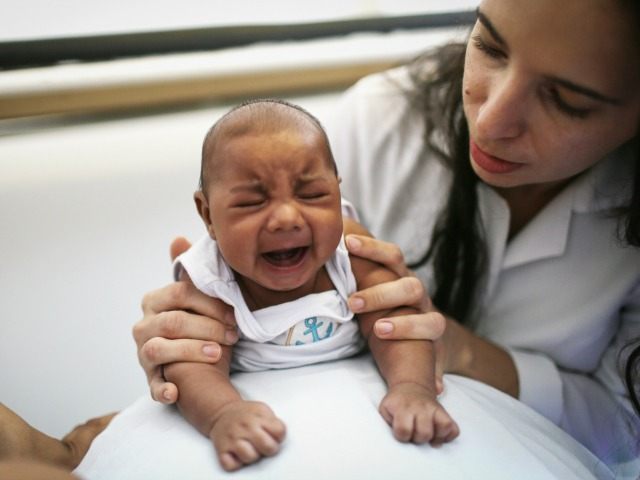Leftist groups and government officials are pressuring pregnant women in the Americas to disregard the sanctity of life in response to the mosquito-borne Zika virus and abort children diagnosed with brain deformities tied to the virus.
In Zika-affected countries and territories in Latin America and the Caribbean, a region where abortion is very difficult, if not illegal, the virus outbreak has sparked a debate over the permissibility of abortion in pregnant women infected with the virus, which has been linked to a neurological disorder known as microcephaly that makes it especially dangerous to pregnant women and their babies.
Microcephaly is a birth defect that causes babies to be born with smaller heads than normal and often have developmental problems.
The U.S. Centers for Disease Control and Prevention (CDC) has warned pregnant American women and females of childbearing age who may become pregnant against traveling to most countries in the Americas where the Zika virus has spread.
CDC lists 24 countries and territories with active Zika virus transmissions, including 22 located in the Americas: Barbados, Bolivia, Brazil, Colombia, Dominican Republic, Ecuador, El Salvador, French Guiana, Guadeloupe, Guatemala, Guyana, Haiti, Honduras, Martinique, Mexico, Panama, Paraguay, Puerto Rico, Saint Martin, Suriname, US Virgin Islands and Venezuela.
“In many of these countries it is very difficult, if not impossible, for women who are already pregnant to get an abortion,” reports the Guardian.
In Brazil, the hardest-hit country, an editorial published by O Globo uses the “national calamity” to push mothers to disregard the sanctity of life, a position that has been emulated in editorials across Latin America.
“It is essential to recognize that women and men have the right to make decisions and existential options and one of the most important choices in the life of a woman is to have children or not,” argues the editorial by sociologist Jacqueline Pitanguy, expressing a view point similar to that of the United Nations, which believes abortion is a human right.
In Brazil, one of the most abortion-restrictive countries in the world, the practice is only allowed to save the pregnant women’s life and in case of rape or incest, reports the Guardian, citing the Center for Reproductive Rights, Amnesty, and Human Rights Watch. At least one judge in the country has announced he would allow abortions for women who can prove their children will be born with microcephaly and that they have the Zika virus inside them.
“The current epidemiological context urgently demands a public debate in the republic, plural and respectful of the right to abortion, anchored in the parameters of choice versus authoritarian imposition,” argues the O Globo.
Leftist Brazilian President Dilma Rousseff is reportedly engaging religious leaders as part of her government’s campaign against Zika to help increase awareness and prevention of the disease. Religious leaders there have not yet remarked on efforts to promote abortion in light of the Zika outbreak.
Colombia, a traditionally right-wing country that has arguably been pushed leftwards by current President Juan Manuel Santos, has been the second hardest-hit country, according to the Associated Press (AP).
There, Fernando Ruiz, the deputy health minister, has said pregnant women suspected of being infected by Zika can have legal access to an abortion if they can prove that the fetus has the neurological disorder microcephaly, reports Radio Nacional de Colombia.
“Colombia’s penal code prohibits abortion in all circumstances, though the penalty is substantially lower where the pregnancy is the result of rape or non-consensual artificial insemination,” reports the Guardian.
In an editorial published by online news outlet El Faro, which covers Latin America, author Laura Aguirre, a doctoral student in sociology at the Institute of Latin American Studies at the Free University of Berlin, ridicules the suggestion by the government of El Salvador for women to abstain from getting pregnant until 2017 to avoid the Zika virus in the country, and suggests that they should be granted access to abortion instead.
El Faro notes that Aguirre’s college thesis was “framed within feminist critical perspectives.”
In El Salvador, “abortion is illegal with no explicit exception to save a woman’s life, with legislation for exceptions having been abolished,” explains the Guardian.
Monica Roa, a spokesman for Women’s Link Worldwide, a pro-abortion NGO, described restrictive abortion laws in Brazil, El Salvador and the Dominican Republic as a “gap in sexual education.”
She indicated that recommendations to postpone pregnancies are “unrealistic,” suggesting that abortions are a better option because most pregnancies in the region are unplanned.
Puerto Rico, where the transmission the disease has been detected, is not immune to the abortion debate shaping up across Latin America.
Health authorities in the U.S. territory have avoided entering the debate, argues a news reporter in the Puerto Rican daily El Nuevo Dia.
The article quotes Dr. Brenda Rivera Garcia, director of the Epidemiology division at the Department of Health in Puerto Rico, as saying that “on the question of allowing abortions in cases where fetuses are identified with microcephaly…it would be very difficult, particularly because the scans performed to identify the disorder are carried out late in gestation.”
“Under US constitutional law, which applies in Puerto Rico, abortion is permitted provided the fetus is not viable, or if the woman’s health is at risk,” points out the Guardian. “However, Puerto Rico also has a criminal statute on the books which prohibits abortions except to protect a woman’s health, a crime punishable by two years’ imprisonment. It is not clear which law supersedes the other.”

COMMENTS
Please let us know if you're having issues with commenting.